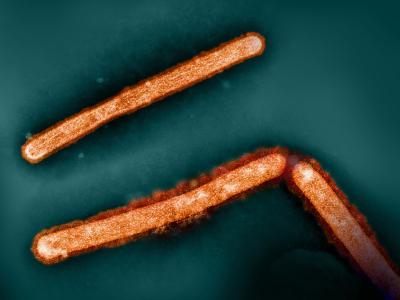NIH Science Lays Groundwork for Future Studies in People
February 11, 2025

Three influenza A (H5N1/bird flu) virus particles (rod-shaped; orange).
National Institutes of Health (NIH) scientists and their colleagues report that a single dose of a broadly neutralizing antibody (bnAb) administered prior to virus exposure protects macaques from severe H5N1 avian influenza. Highly pathogenic avian influenza (HPAI) H5N1 viruses have sporadically spilled over from birds into many other animals, including humans and dairy cows, in recent years. Although it has not yet acquired the capacity to spread readily between people, H5N1 has pandemic potential, which has spurred efforts to develop effective treatments and other countermeasures.
The investigators studied a bnAb called MEDI8852, which was discovered and developed by Medimmune, now part of AstraZeneca. MEDI8852 targets a portion of a key flu protein that is less prone to change than other parts of the virus and thus is capable of conferring protection against a wide range of flu viruses. In the new study, a group of macaques received an injection of MEDI8852 and were exposed to aerosolized HPAI H5N1 virus three days later. All the pre-treated animals survived and experienced no or very limited signs of disease. In contrast, a group of control macaques developed severe or fatal illness within a short time after virus exposure. Of note, the scientists determined that MEDI8852 remained in the body for a prolonged time after the injection. According to scientists, protection from severe disease would extend to weeks beyond antibody infusion, providing a realistic preventative window in the face of an H5N1 outbreak.
The research was conducted by Masaru Kanekiyo, D.V.M, Ph.D., and colleagues from NIH’s National Institute of Allergy and Infectious Diseases (NIAID) Vaccine Research Center (VRC) along with investigators from the University of Pittsburgh. It was published in Science.
ARTICLE:
M Kanekiyo et al. Pre-exposure antibody prophylaxis protects macaques from severe influenza. Science DOI: 10.1126/science.ado6481 (2025).
WHO:
Dr. Kanekiyo, VRC, NIAID, is available to comment.
This research was supported by the Vaccine Research Center, NIAID, NIH, as well as grants R01AI154894 and UC7AI180311 and contracts 75N93021C00014 and HHSN261201500003.
Contact
Submit a Media Request
Contact the NIAID News & Science Writing Branch.

